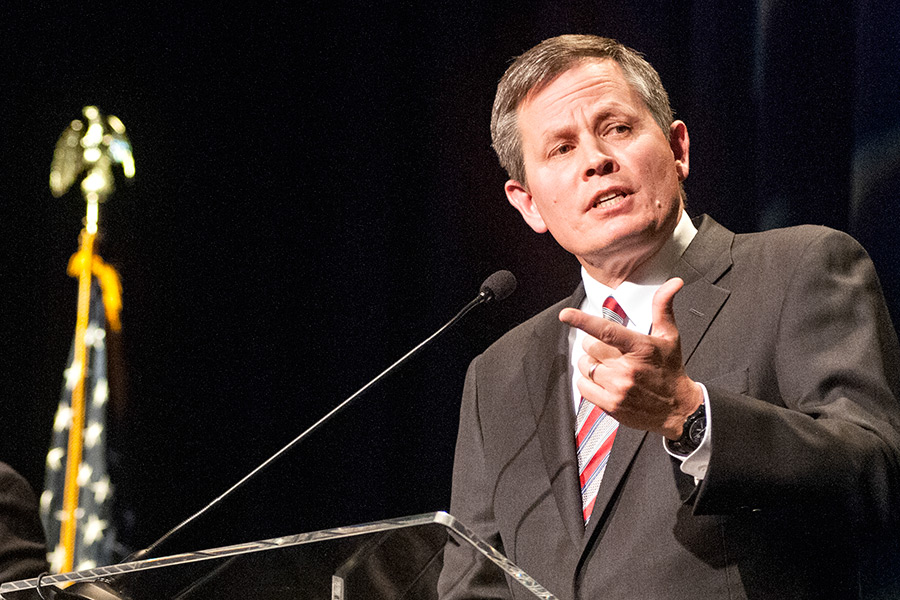Once a central theme of every election cycle, political debates have eroded as candidates on both sides of the aisle decline invitations, either as calculated political maneuvers or due to legitimate scheduling conflicts.
And while the strategy may be serving some campaigns well, pundits say that a dearth of the public forums is a disservice to voters of all stripes and party affiliation.
“There is no formal rule compelling the candidates to debate but it has certainly become a standard and an accepted practice as part of the campaign. I think it is something that the voters expect and deserve,” Robert Saldin, an associate professor at the University of Montana, said.
Debates can catch a candidate off guard and reveal chinks in their on-message armor, which is not favorable to a candidate working to craft an impenetrable campaign image.
Just one debate between Montana’s U.S. House candidates, Republican Ryan Zinke and Democrat John Lewis, is scheduled in Bozeman between now and the election. In the U.S. Senate race between Republican Rep. Steve Daines and Democrat Amanda Curtis, there is one debate tentatively scheduled in Billings.
Daines and Curtis, a Democratic state representative from Butte who is considered the underdog, are competing for Montana’s open U.S. Senate seat. Libertarian Roger Roots of Livingston also is in the race.
Montana’s Senate race is one of a dozen nationwide that could determine whether Republicans take control of the U.S. Senate this fall.
Curtis’ camp chided Daines for declining to accept her invitation to debate in 14 cities statewide.
“Congressman Daines is trying to coast through this election without explaining his terrible record of voting against Montanans in favor of handouts for his millionaire friends,” said Curtis spokesperson Les Braswell.
But Saldin said it makes sense that Daines wouldn’t engage in the request for debate.
“Daines has absolutely nothing to gain and Curtis has absolutely nothing to lose. So that is an easy calculation,” he said. “There has to be some thinking by Daines at this point about just running out the clock and keeping his head down. He is not a sloppy guy prone to mistakes but the more you are out there the more chances there are that something could go wrong. So it is understandable that he doesn’t want to go out and have a bunch of debates against an opponent that is really struggling.”
More surprising, Saldin said, is the lack of debates between Montana’s U.S. House candidates. John Lewis, a Democrat, and Ryan Zinke, a Republican, have agreed to a single Oct. 4 debate in Bozeman, to be hosted and broadcast statewide that evening by the Montana Television Network stations. They’re running for the open seat now held by Daines. Libertarian Mike Fellows of Missoula is in the race, too.
Other news outlets have been attempting to organize additional debates among the congressional candidates this fall, but none have been confirmed.
Zinke withdrew from a scheduled Sept. 29 debate with Lewis in Billings, sponsored by the Billings Gazette and Yellowstone Public Radio. Montana Public Television also had planned to broadcast the event statewide.
The Gazette and Yellowstone Public Radio still plan to hold a public forum with Lewis that evening.
Zinke’s campaign said he had scheduling conflicts and that he’ll be in Texas that evening. The campaign declined to say what type of event he’s attending in Texas.
Saldin said a public debate forum could benefit both candidates, neither of whom enjoys high-profile name recognition in a race that is fairly close.
“The polling we have suggests that the House race is reasonably close and Zinke is certainly not a household name like Steve Daines. And he had a really rough go of it in the primary. He obviously won, but he came out a little bruised and with the party splintered,” Saldin said. “It seems to me that he would have a lot to gain from debates.”
Saldin said challenging a candidate to 14 debates is overkill, but that three or four debates is reasonable, even if they do serve a limited purpose.
“That is pretty standard for big statewide races. Both of those guys have something to gain from a few debates, unless they just don’t feel comfortable in that setting. It really plays to certain aspects of a candidacy that arguably don’t have much to do with executing the job they are trying to get. There is something kind of crude about the enterprise of debates but it is kind of one of those practices that we all accept now,” he said.
